
Because of this new format, I was able to screen a greater number of films than I have in the past. In total, I watched 18 feature offerings, most of which were above average to excellent. Below are my reviews of the releases I watched, some of which truly had me … reeling.
“Cicada” (U.S.) Score: 4.5/5 (****+)
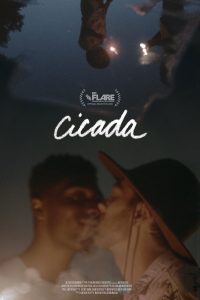
A heart-wrenching look at how two gay male partners (Matthew Fifer, Sheldon D. Brown) in an interracial relationship work together at solving their respective past traumas and how the power of love can significantly aid and smooth the process. This fact-based dramatic love story, written and directed by protagonist Fifer, is peppered with inventive and whimsical touches of comic relief and featuring an excellent ensemble cast (especially Cobie Smulders as a kooky unconventional therapist) and moves viewers deeply, earning every single bit of empathy that it draws out of audiences. Easily one of the most endearing and honest love stories I’ve ever seen, sexual orientation aside. Don’t miss this one – my top pick from the festival.
“The Capote Tapes” (U.S./U.K.) Score: 4/5 (****)
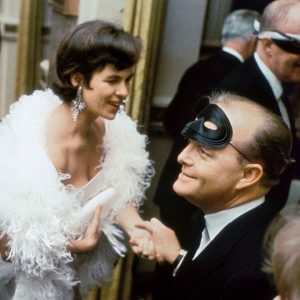
Flamboyant, openly gay author Truman Capote may not have been especially prolific, but he wrote several noteworthy, well-respected works. However, when excerpts of what was supposed to be his crowning achievement – the novel Answered Prayers about the dirty little secrets of New York high society based on the lives of a number of his “friends” – he became a pariah of sorts, losing contact with many of those close to him and triggering a speedy downward spiral in his health and well-being. In this new documentary, excerpts of recorded interviews with many of his friends and colleagues and new interviews with those who knew him and studied his work shed light on the enigmatic icon, his life and his writing, particularly with regard to his final and unfinished work. Included are archive segments featuring Lauren Bacall, Candice Bergen, George Plimpton, Norman Mailer, Lee Radziwill, Harper Lee, William F. Buckley and Capote’s partner Jack Dunphy, along with new conversations with author Jay McInerney, journalist Sally Quinn, Vogue editor André Leon Talley and talk show host Dick Cavett, among others. Director Ebs Burnough’s debut feature presents a captivating look at a talented, troubled and towering figure.
“Ema” (Chile) Score: 4/5 (****)
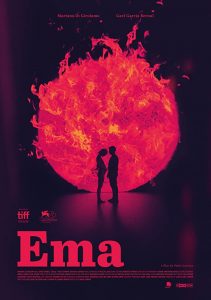
Acclaimed Chilean director Pablo Larraín’s latest offering explores the exploits of a free-spirited bisexual dancer (Mariana Di Girolamo) and the lengths she’ll go to in order to regain access to the troubled adopted son (Cristián Suárez) that she and her husband (Gael García Bernal) hastily gave up in the wake of the child’s bizarre antisocial behavior, a trait the youngster shares with his mother. Easily Larraín’s most experimental release, “Ema” is sometimes inscrutable yet always captivating, especially in its compelling dance and erotic sequences, a visually delightful, troubling and arousing palette. This one won’t suit everyone, but, for those who enjoy watching envelope-pushing cinema, this one will be right up your alley.
“Galore” (Netherlands) Score: 4/5 (****)

When plus-size Dutch drag queen Lady Galore (Sander den Baas) decides to undergo gastric bypass surgery to help improve the state of her health, she wonders whether the change in her body size and shape will affect how others have come to identify her. Will the persona she’s so carefully crafted disappear with the pounds she’s about to lose as a result of her procedure? Or will she be able to reinvent herself and maintain the level of visibility and popularity she’s already attained? This intimate documentary about her journey into a new life provides an intriguing look at a charismatic and caring individual who fights for dignity, self-respect and recognition for herself and her community, even through all the changes and challenges she undergoes. An inspiring and uplifting true life tale from directors Dylan and Lazlo Tonk.
“Give or Take” (U.S.) Score: 4/5 (****)
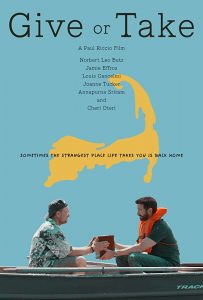
When the estranged adult son (Jamie Effros) of a deceased late-blooming gay man returns home to Cape Cod to settle his affairs and make provisions for his father’s surviving partner (Norbert Leo Butz), the trip raises issues of love, loss and self-reflection for all concerned in this sensitive tale of trauma, healing and forgiveness. While the film has a tendency to become occasionally repetitive in the second half, writer-director Paul Riccio’s debut feature treats its subject matter tenderly yet honestly and forces its characters to come to terms with who they are, for better or worse. A well-made effort for a small independent production that skillfully incorporates gay themes without dwelling on them or bombarding audiences with rhetoric.
“Single Street” (“Singel 39”) (Netherlands) Score: 4/5 (****)
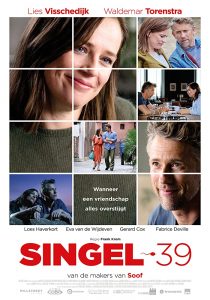
Though slightly formulaic in nature, this otherwise-delightful Dutch alternative rom-com from director Frank Krom tells the story of a lonely heart surgeon (Lies Visschedijk) who becomes best friends with her gay male neighbor (Waldemar Torenstra). As the two grow closer, it’s apparent that their friendship runs deep, but, when talk of making a baby enters the picture, matters grow complicated, especially when changes of heart enter the picture. This breezy, witty tale could have handled a few aspects differently, but it aptly shows that love need not always conform to conventional expectations, a message we could all stand to hear a little more often than we do.
“Tahara” (U.S.) Score: 4/5 (****)

When the unusual fusion of teen sex comedy meets coming out/coming of age tale meets Jewish humor, you’ve got director Olivia Peace’s debut feature, “Tahara,” a delightfully humorous spin on a tried-and-true formula long overdue for the infusion of fresh new influences. While the picture admittedly suffers from some occasional pacing problems (due to several overlong, overly talky scenes), the overall result is a laugh-out-loud funny romp that skewers taboo material and the film’s source genre on a variety of fronts in a variety of ways. The picture’s inventive use of animation and claymation and excellent ensemble cast (especially protagonists Madeline Grey DeFreece and Rachel Sennott) add further charm and whimsy to an already-clever narrative, making for an enjoyable time at the show. Fun, fun, fun!
“Cocoon” (“Kokon”) (Germany) Score: 3.5/5 (***+)
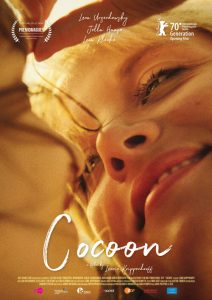
When a shy, nerdy Berlin teen (Lena Urzendowsky) who breeds caterpillars as a hobby begins to discover her budding lesbian identity, she starts to blossom like the butterflies who are morphing inside their cocoons. While the film has a tendency to meander in spots, the picture’s overall story and script are largely spot-on, rich in nuance, symbolism and subtle humor, all the while taking the narrative in some pleasantly unexpected directions. A tauter screenplay would have allowed this one to truly shine, but, as it is, it takes flight pretty well enough on its own. A soaring sophomore effort from director Leonie Krippendorff.
“Goodbye Mother” (“Thua Me Con Di”) (Vietnam) Score: 3.5/5 (***+)

This tender comedy-drama-love story about a Vietnamese emigre-turned-U.S. citizen (Lanh Thanh) who returns home for a family ceremony with his gay lover (Vo Dien Gia Huy) in tow touches on all the right themes when it comes to the challenges of coming out in a culture strongly resistant to the idea. Many sweet moments, many bittersweet moments and a number of unexpected surprises give shade and coloring to this sometimes-awkward, sometimes-uncomfortable, often-humorous tale. Admittedly there are a few too many secondary story threads running through the narrative that tend to bog down the flow (especially in the final act), but, in general, director Trinh Dinh Le Minh’s sophomore effort is a touching, warm-hearted offering about love, romance, togetherness and the things that both lift them up and weigh them down.
“Dramarama” (U.S.) Score: 3/5 (***)

When a closeted gay teen (Nick Pugliese) contemplates coming out at a farewell party for his drama club high school classmates (Anna Grace Barlow, Nico Greetham, Megan Suri, Danielle Kay) as they leave for college in 1994, the evening turns into a free-for-all of emotions, both good and bad, for the entire group. While the exchanges do have their wickedly funny moments, the laughs are a little too few and far between (and sometimes a little too forced) to make this story work, especially when the conversations get bogged down by sniping, petty squabbles, and heavy emotional (and, sometimes strangely enough, religious) discussions. The supreme eloquence of the teenage cast members also seems a bit incongruous for their characters, as they speak with an articulation, erudition and wit that seem well beyond their years, especially in light of the naïvete that also emerges. And, as for that coming out issue, what seems like it’s going to be the central thrust of the narrative is all too often relegated to the back burner, reconciled to almost-superfluous secondary treatment. In short, director Jonathan Wysocki’s debut feature comes across like a well-intentioned, pleasantly nostalgic, autobiographical stroll down memory lane, but it’s one that’s probably a little too “inside” to be fully understood and appreciated. Nice try, but no awards here.
“No Hard Feelings” (“Futur Drei”) (Germany) Score: 2.5/5 (**+)
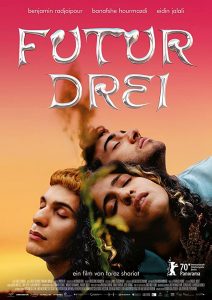
When a German-born son of Iranian immigrants (Benny Radjaipour) befriends a refugee brother (Eidin Jalali) and sister (Banafshe Hourmazdi) from his family’s homeland, a tentative but passionate romance develops between the two young men in the face of an uncertain future. This tale of love, acceptance, fitting in and finding oneself has its insightful moments of tenderness, emerging wisdom and righteous empowerment on multiple fronts. Unfortunately, uneven pacing, the use of experimental montages that don’t always work, and a variety of story elements that, regrettably, lose something in translation or end up superfluous intrude upon the aspects of the film that do work, creating an uneven mix overall. It’s intriguing to see a story that attempts to deal with a segment of society that has largely gone overlooked; it’s just a shame that director Faraz Shariat’s debut feature didn’t handle it better than it did.
“The Strong Ones” (“Los Fuertes”) (Chile) Score: 2.5/5 (**+)

While it may provide little-known insights into an unfamiliar culture and footage of a venue that’s not a readily recognizable film setting, this Chilean gay male romance features a narrative that’s about as trite and predictable as they come. The “forbidden love affair that can’t last” has been done so many times over the past four decades that it’s become tired and clichéd at this point. Even if this offering represents groundbreaking material by Chilean cinema standards, the story follows this formula to the letter so faithfully that there’s virtually nothing in it that one doesn’t see coming from a mile away. In fact, the most interesting aspects of the film lie in its secondary stories, its gorgeous cinematography and its symbolic (though underused) thematic visual allusions. Gay cinema has taken its time getting beyond stories as familiar and well worn as this, and releases like this from director Omar Zúñiga Hidalgo unfortunately tend to bog down the progress the genre has made in striking out in new directions. This one, instead, just strikes out.
“Drawn Back Home” (U.S.) Score: 2/5 (**)

When a thirty-something gay man (Paul Michael Thomson) returns to the small town that he fled because of his parents’ intolerance, he reunites with his long-lost best friend (Mickey O’Sullivan) for a reunion that carries deeper ramifications, leaving him with a big decision about his future. While the “home is where the heart is” narrative is indeed sweet and touching, its execution here is undermined by wooden acting, stilted writing, inconsistent character development, clichéd editing, occasionally laughable cinematography and a stunningly preposterous lack of chemistry between the protagonists. The heart of director Thomas Awrey’s debut feature may be in the right place, but that sentiment is so badly overshadowed by all of the film’s other problems that it’s not allowed to shine as well as it otherwise might have. Salvaging this offering may have been possible, but only with a sorely needed script rewrite, better casting and an overhaul of the production logistics. A missed opportunity, for sure.
“A Skeleton in the Closet” (“Todos tenemos un muerto en el placard o un hijo en el closet”) (Argentina) Score: 2/5 (**)
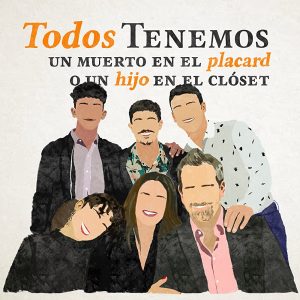
As the title implies, there’s definitely a closet here, but what exactly constitutes the skeleton inside it leaves much to the imagination (and, if it’s what I think it is, it doesn’t send a terribly empowering or affirming message, either). Director Nicolás Teté’s domestic drama about a twenty-something gay man (Facundo Gambandé) trying to find himself when he pays a visit to his overly polite family in his small but less-than-open-minded hometown after years in Buenos Aires is all over the map with a variety of story threads, many of them linked with pointless filler that serves as little more than padding or bridges between segments. The characters aren’t especially interesting, nor are their rather predictable, clichéd dilemmas. Add to that a truly annoying background score that sounds like something out of a made-for-cable TV movie, and you’ve got a mix that makes one want for an ending (and the one viewers get isn’t especially satisfying, either). Next...
“Stone | Fruit” (U.S.) Score: 2/5 (**)
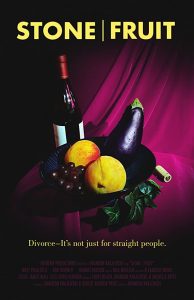
There’s witty repartee and then there’s unnatural banter, and, when it comes to this comedy-drama about a divorcing gay male couple (Rob Warner, Matt Palazzolo) spending one last weekend together to achieve closure about their decision, it’s definitely a grandiloquent exercise of the latter. This failed attempt at saying something meaningful about the ending of a relationship tries way too hard, with over-the-top dialogue that’s so pretentiously overwritten that it’s genuinely difficult to sit through the opening hour. Admittedly, writer-director Brandon Krajewski’s debut feature gets better further into the story, but it’s not enough to save this slog, even if you’re able to make it that far into the film. What ultimately plays like an evening with the queens matching wits at a gay bar doesn’t do this subject justice, and that’s an even bigger shame than the painful decision faced by the picture’s two parting protagonists.
“Are We Lost Forever” (Sweden) Score: 1.5/5 (*+)
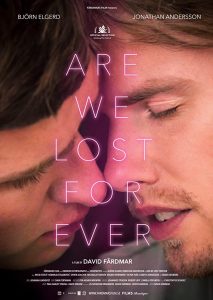
Director David Färdmar’s tedious, whiny slog through the breakup of a gay male couple’s on-again/off-again, on-again/off-again, on-again/off-again relationship and what happens when each partner (Jonathan Andersson, Björn Elgerd) meets someone new tries the patience of even the most earnest moviegoer. The film’s often-circular script, protracted shots of oh-so-sincere emoting, occasionally ridiculous dialogue and a positively detestable protagonist make viewers long for the ending that seems forever in coming. Indeed, just because breakups can be painful, that doesn’t mean we must have a ringside seat to watch every exhausting moment of the action unfold. Pick another movie instead.
“Family Members” (“Los miembros de la familia”) (Argentina) Score: 1/5 (*)
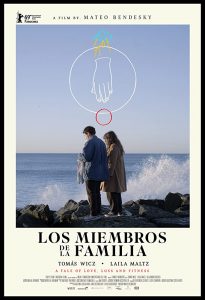
Despite some modestly interesting characters and occasionally intriguing ideas, director Mateo Bendesky’s rambling, minimalist, surreal drama-comedy (a term I’d use very loosely) never (and I do mean never) finds any meaningful traction. While billed as a coming of age/coming out tale with a metaphysical twist (dressed up in a largely snide, smarmy package), this utterly strange, totally directionless mess ambles along toward a hoped-for payoff that’s never reached. Don’t waste your time.
“Luz” (U.S.) Score: 1/5 (*)

What begins as a cellmate friendship turns into a prison romance in which the separated partners (Ernesto Reyes, Jesse Tayeh) must cope with their circumstances when paroled at different times, a situation that becomes further complicated once both are in the outside world again. Unfortunately, despite this mildly intriguing premise, director Jon Garcia’s overlong offering gets bogged down in subplots that are never fully developed and/or descend into the depths of predictability. I couldn’t wait for this one to end and to see what neat, tidy wrap-up it would employ before the credits rolled (something my eyes were already doing throughout much of the film’s second half).
Copyright © 2020, by Brent Marchant. All rights reserved.

No comments:
Post a Comment